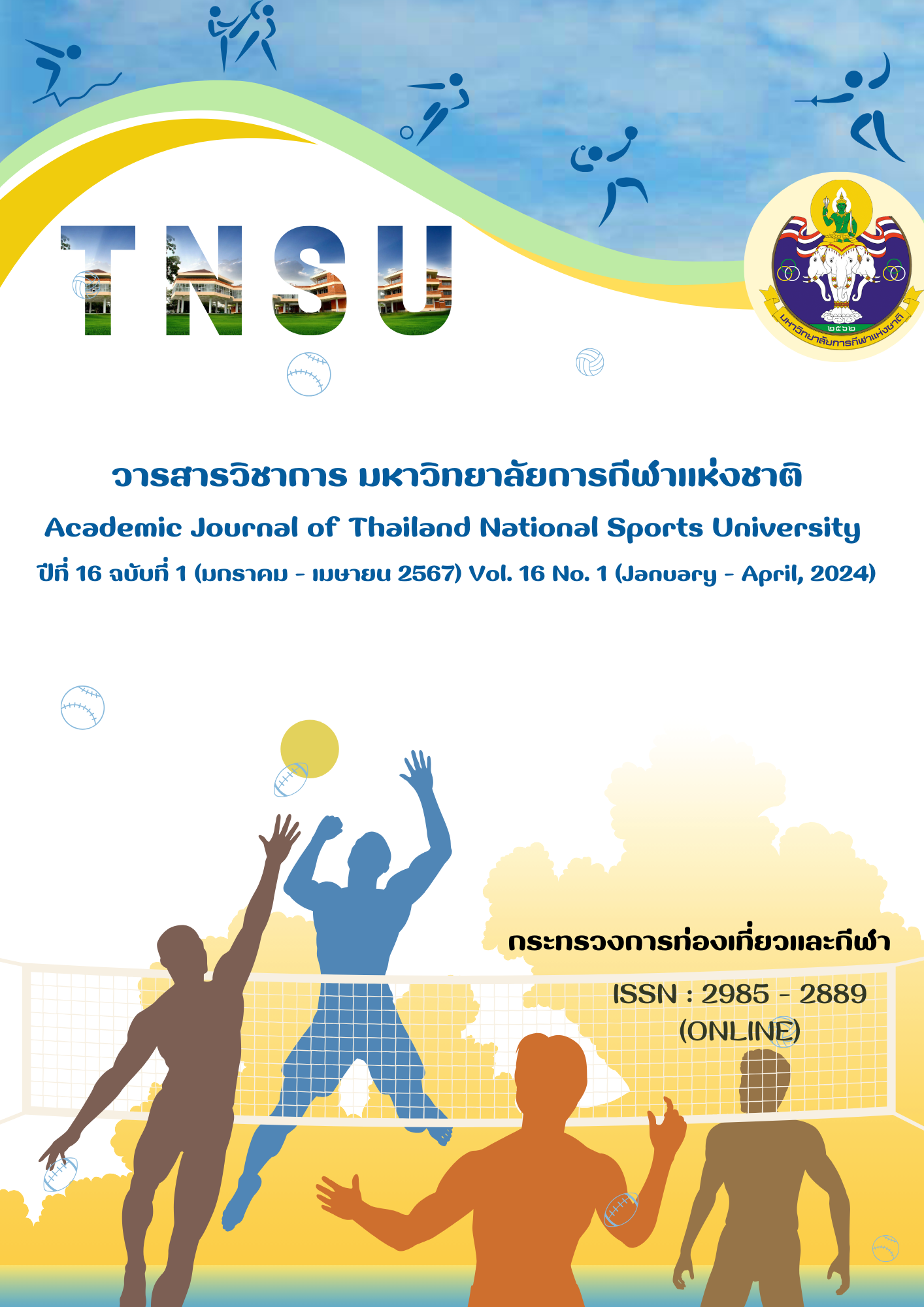DEVELOPMENT OF A COMPUTER FEEDBACK TESTING SYSTEM FOR MEASURING TEACHER COMPETENCY: RESEARCH KNOWLEDGE FOR PROBLEM SOLVING AND LEARNER DEVELOPMENT OF STUDENTS OF THE THAILAND NATIONAL SPORTS UNIVERSITY
Main Article Content
Abstract
The objectives of this research were to develop the measurement test of teacher competency: research knowledge for problem solving and learner development of students and to develop a computer feedback testing system for measuring teacher competency: research knowledge for problem solving and learner development of students of the Thailand National Sports University. This research development with the concept of two-parameter item response model. The researchers examined the quality of items with 365 students by a multi - stage sampling method and experimented the testing system with 83 students in their fourth year by purposive sampling. The instruments comprised a standard based evaluation scale and a satisfaction evaluation scale for a computer feedback testing system, there were 5 - point rating scales. Data were analyzed using frequency, percentage, mean, standard deviation, skewness, and kurtosis.
The research finding was as follows, the development of measures of teacher competency: research knowledge for problem solving and learner development. The quality of the items for content validity, discriminant of item, the difficulty of item according to the criteria and the quality of the measurements was checked by determining the reliability of the entire items, the result was 0.82. and the development of a computer feedback testing system for measuring teacher competency: research knowledge for problem solving and learner development of students of the Thailand National Sports University. The assessment of the quality of the system with standards based evaluation was conducted, and the results showed that the quality of the system reached high levels ( = 4.19, S.D. = 66) and the assessment result of student satisfaction, the results showed that most students were satisfied with the system at the highest levels (
= 4.31, S.D. = 0.61).
Article Details

This work is licensed under a Creative Commons Attribution-NonCommercial-NoDerivatives 4.0 International License.
The published article is a copyright of the Academic Journal of Thailand National Sports University. The passage appeared in each article in this academic journal is a perspective of each author which is not related to the journal. Each author is required to be responsible for all components of his/her own article. If there are any mistakes, each author must be responsible for those mistakes on his/her own.
References
Government Gazette. (2020, March 20). Announcement of the teachers’ council of Thailand committee on details of standards of knowledge and professional experience of teachers according to the Teachers’ Council of Thailand regulations on professional Standards. No. 137. Special Section 68 Ngor. Page 18 - 20.
Benjamaporn Senarat, & Somprasong Senarat. (2018). Principles of educational measurement and evaluation. Maha Sarakham: Apichart Press.
Juthaporn Masantiah. (2017). Development of a computer - based testing system with immediate feedback for different student’s ability levels: Application of Rasch Sirt model (Doctoral dissertation), Chulalongkorn University.
Khurusapha. (2021). Test blueprint for testing and evaluating teachers' professional competencies knowledge and professional experience according to professional standards. Retrieved from https://www.ksp.or.th/ksp2018/2021/07/32234/
Nhabhat Chaimongkol. (2015). System development for on-the fly assembled multistage adaptive testing with reflective feedback in information technology professional examination (Doctoral dissertation), Chulalongkorn University.
Reckase, M. D. (2010). Designing item pools to optimize the functioning of a computerized adaptive test. Psychological Test and Assessment Modeling, 52(2), 127 - 141.
Rungimaporn Noonoi. (2019). Development of hybrid computerized adaptive testing system by maximum priority index method and progressive - restricted standard error method (Doctoral dissertation), Chulalongkorn University.
Sahin, A. & Aml, D. (2017). The effects of test length and sample size on item parameters in item response theory. Educational sciences: Theory & practice, 17(1), 321 – 335.
Sirichai Kanjanawasee. (2011). Evaluation theory (8th ed.). Chulalongkorn University Publishing.
Sirichai Kanjanawasee. (2012). Modern test theories (4th ed.). Chulalongkorn University Publishing.
Supamas Chumkaew. (2018). Needs assessment of teachers’ assessment literacy. Academic Services Journal, Prince of Songkla University, 29(1), 88 - 94.
Surangrat Rachong, Somprasong Senarat, & Benjamaporn Senarat. (2020). Development of an item bank of basic knowledge teacher spirit for early childhood education teachers using 4 - parameter item response theory. Journal of Education Burapha University, 31(3), 52 – 67.
Suwit Somsuphaprungy, Sangtong Boonying, & Anek Putthidech. (2020). A factors of task technology fit used for the performance of department. SAU Journal of Science & Technology, 6(1), 34 - 44.


